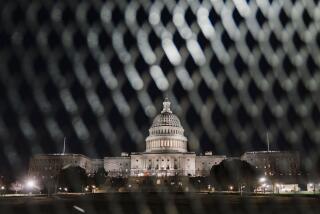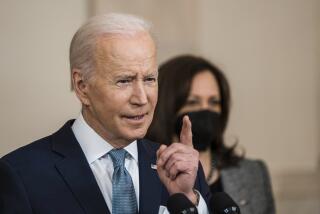Weinberger Will Spell Out Policy on Commitment of U.S. Forces
- Share via
WASHINGTON — Defense Secretary Caspar W. Weinberger, who has been criticized for suggesting that U.S. military power should be used only in limited circumstances, will assert in a speech in Sacramento today that the President has a constitutional duty to build public support before committing American troops abroad, sources said Thursday.
In what is being billed as a major address written largely by Weinberger himself, he is expected to answer much of the criticism leveled at his past speeches advising caution in the exercise of American military power.
Unlike previous speeches, which gave the impression that Weinberger’s views clashed with those of Secretary of State George P. Shultz, this one is said to have been approved in advance by officials both at the White House and the State Department. In the past, Shultz has placed more emphasis than Weinberger on the need to combine diplomacy with the threat of force.
According to sources, Weinberger will try to clarify his previous declaration that military force should not be used without “some reasonable assurance we will have the support of the American people and their elected representatives in Congress.” Weinberger thinks this statement was misinterpreted to mean that the President must be bound by public opinion polls.
Instead, he is expected to emphasize that the President has a constitutional duty to build a consensus for such action--a distinction he sees as the fundamental difference between the use of military force by the United States and the Soviet Union. Unlike the Soviets, who act on behalf of the state, the United States can act only with the consent of the governed, he is expected to say.
The speech, which sources characterized as a philosophical framework for dealing with current national security issues, is being delivered at a time when President Reagan has embarked on a campaign to build public support for retaliation against terrorist attacks on Americans in the Middle East and Central America.
Congress has recently demonstrated an increased willingness to provide U.S. aid to non-Communist rebels in regional conflicts that previously would have raised the specter of “another Vietnam.” For example, the House several weeks ago approved a measure specifying the circumstances under which Reagan could commit troops in Central America.
Weinberger’s sentiments reflect the prevailing opinion within the military since the Vietnam War that the United States should never again become involved in a shooting war without a well-defined mission, sufficient forces and the support of public opinion.
The Sacramento speech, to the Comstock Club, also elaborates on the opinion he expressed in a debate at the Oxford Union last year, denying any “moral equivalence” between the actions of the two superpowers.
To underscore his view of the difference between the use of military power by the United States and the Soviet Union, sources said, Weinberger will note that the Soviets have occupied Afghanistan since December, 1979, without regard to opinion--while the United States was forced to withdraw from Vietnam in 1973 because the war lacked public support.
The defense secretary also reportedly will tackle the issue of Congress’ veto power over U.S. emergency military actions abroad. Sources said he will argue that the President will have congressional support only if he previously has taken time to foster public support.
More to Read
Sign up for Essential California
The most important California stories and recommendations in your inbox every morning.
You may occasionally receive promotional content from the Los Angeles Times.













